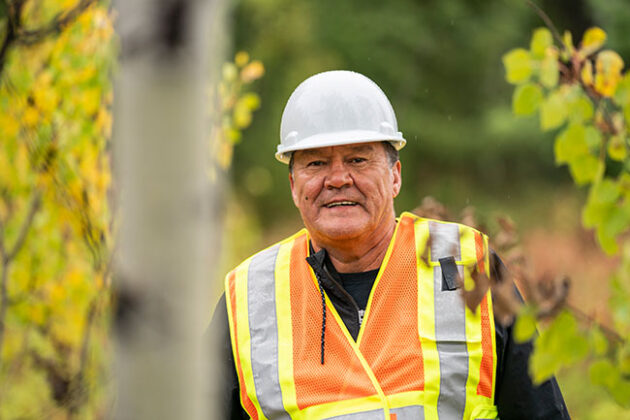[ad_1]
Equity. A powerful word that, unlike equality, champions the promise of fairness by recognizing individual needs rather than aspiring to achieve sameness. As Indigenous people seeking to collaborate and lead in the forest industry, we desire equitable opportunities. I believe to reach true equality in the future, we need to walk the pathway of equity, and the way forward starts first in understanding the meaning of truth and reconciliation.
As a survivor of a residential school, I’ve witnessed the profound pain and trauma that has affected not only my own life but also countless families and generations of survivors. As a previously elected Chief and a current councillor, I am deeply engaged with balancing my personal experiences while harnessing a progressive business perspective. My role as the executive director of Central Chilcotin Rehabilitation has further confirmed my beliefs that reconciliation is not just about acknowledging the past; it’s about reshaping the present and future to embrace the ideals of unity, opportunity, collaboration, and equity. While many times I see the tendency to lean toward offering economic incentives as the solution to help heal past injustices, it’s becoming more evident to me that a more comprehensive approach is important. While it’s good to strive to create opportunities for work, we must also place strong emphasis on building understanding and acknowledging that both healing and empowerment require a holistic approach.
In the forestry sector, the road to reconciliation is a winding one mixed with challenges, yet there has been significant progress and transformation.
These are three areas where I believe we can start:
Recognize and understand the barriers for Indigenous communities: Many Indigenous communities have faced systemic barriers in accessing resources and opportunities in the industry. In some cases, opportunities remain elusive due to a lack of capacity, resource availability, or even preconceived notions that limit access. The offer of forest licences, for instance, can be a gesture of goodwill, but it requires substantive follow-through to truly empower communities. Acknowledging these barriers is crucial for creating a more equitable forestry sector.
Empower Indigenous communities: Empowering Indigenous communities in forestry can include recognizing their right to make decisions about the management of their lands and resources. It may involve co-management agreements, joint ventures, or granting Indigenous communities a stronger role in helping shape forest management practices. When Indigenous communities can help shape their futures, it can lead to more sustainable and culturally aligned forest management solutions.
Work at all levels of government to take a unified approach: Achieving equity in forestry requires all levels of government to work collaboratively with Indigenous communities to develop forestry policies that align with reconciliation principles. This means addressing land rights, resource-sharing agreements, and regulatory frameworks that respect Indigenous knowledge and values. And it starts with listening to the aspirations of Indigenous communities and working in collaboration to find mutually beneficial solutions for everyone. I have seen progress being made through many government agencies opening their doors to greater Indigenous involvement and an increased understanding of the need to incorporate Indigenous practices into land management.
I invite all readers to join this journey. Whether you’re a seasoned forester, a student or a concerned citizen, we can make a difference by opening our minds to both traditional and innovative ways of doing things, listening, and learning. Reconciliation in forestry is about recognizing historical imbalances and taking steps to move forward together. It’s not about equal rights to a resource; it’s about working toward a fair distribution of benefits while preserving the forest for future generations. Think of equity as our collective guide toward a future where the opportunities for Indigenous communities are holistic in approach and tailor-made to help us catch up and thrive in a country that has been moving forward without us for far too long.
 Percy Guichon, an Indigenous leader and a passionate advocate for reconciliation through his work in forestry, has previously served as the Chief and is now a councillor for the Tŝideldel First Nation. He is the executive director of Central Chilcotin Rehabilitation, Ltd.
Percy Guichon, an Indigenous leader and a passionate advocate for reconciliation through his work in forestry, has previously served as the Chief and is now a councillor for the Tŝideldel First Nation. He is the executive director of Central Chilcotin Rehabilitation, Ltd.
[ad_2]
Source link
